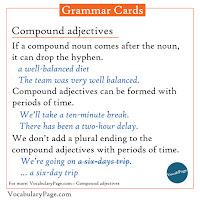In English, some adjectives can consist of two or more words. These are compound adjectives. Compound adjectives are usually written with hyphens when they are used in front of a noun they modify. For example, in the phrase ‘man-eating lion’, ‘man-eating’ is a compound adjective. ‘Man eating lion’ means something different. As you can see, a hyphen changes the meaning of a phrase.
Here are some examples of compound adjectives:
- She has a well-behaved child.
- He is a good-looking young man.
- It’s sugar-free chewing gum.
- They are long-distance lorry drivers.
If a compound noun comes after the noun, it can drop the hyphen.
- a well-balanced diet
- The team was very well balanced.
Compound adjectives can be formed with periods of time.
- We’ll take a ten-minute break.
- There has been a two-hour delay.
- I was on a two-year contract.
We don’t add a plural ending to the compound adjectives with periods of time.
- We’re going on
a six-days trip. - … a six-day trip
Other common types are:
Adjective
|
+
|
Past participle
|
old-fashioned
|
narrow-minded
|
|||
dark-haired
|
|||
Adjective
|
+
|
Present participle
|
good-looking
|
long-running
|
|||
easy-going
|
|||
Adverb
|
+
|
Past participle
|
well-established
|
brightly-coloured
|
|||
densely-populated
|
|||
Noun
|
+
|
Past participle
|
sun-baked
|
wind-blown
|
|||
water-cooled
|
|||
Noun
|
+
|
Present participle
|
eye-catching
|
mouth-watering
|
|||
money-saving
|
|||
Noun
|
+
|
Adjective
|
world-famous
|
sugar-free
|
|||
book-smart
|



Comments
Post a Comment